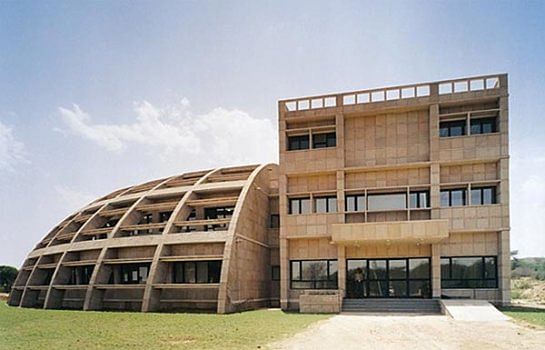M.Sc Neuroscience

M.Sc Neuroscience is a two-year postgraduate degree course that deals with the main areas of study about the structure and function of neurons, nerves, and nervous tissue and their behaviour of working mechanisms. The students pursuing the M.Sc Neuroscience course have many job opportunities in India and abroad in multiple domains such as Forensic Science Labs, Colleges & Universities, Genetic Counselling Enters, Health Sciences, Pharmaceutical Companies, Public Health Centers, Mental Health Centers, Psychology Centers, etc.
M.Sc Neuroscience Course Details
| Degree | Masters |
| Full Form | Master of Science in Neuroscience |
| Duration | 2 Years |
| Age | 20 |
| Subjects Required | Physics, Chemistry, Biology |
| Minimum Percentage | 50% Aggregate in Undergraduate |
| Average Fees | ₹6K - 17K PA |
| Similar Options of Study | M.Ch in Neuroscience, MD in Pathology |
| Average Salary | INR 3 - 4 LPA |
| Employment Roles | Biochemist, Neurologist, Educational Psychologist, Animal Neurologist, Neural Engineer etc |
| Top Recruiters | Hospitals, Universities, Colleges, Public Health Centers, Pharmaceutical Companies, etc |
About M.Sc Neuroscience
AAAS defines M.Sc Neuroscience as "Neuroscience is a rich field devoted to studying the many facets of the nervous system. The nervous system includes both the central nervous system, consisting of a brain and spinal cord, and the peripheral nervous system consisting of the nerves that lie in the extremities, muscles, and organs." The course falls under the umbrella of the M.Sc course and therefore follows a similar foundation of the study. The important subjects of the course are Biochemistry, Neuroanatomy, Neurochemistry, Genetics, Immunology, and much more.
Table of Contents
- M.Sc Neuroscience Eligibility Criteria
- M.Sc Neuroscience Admission Process
- Popular M.Sc Neuroscience Entrance Exams
- Top M.Sc Neuroscience Colleges
- Why Choose M.Sc Neuroscience?
- M.Sc Neuroscience Fees Structure
- M.Sc Neuroscience Syllabus and Subjects
- Preparation Tips for M.Sc Neuroscience
- Scope of Higher Education for M.Sc Neuroscience
- M.Sc Neuroscience Salary
- M.Sc Neuroscience Career Options
- Skills to Excel
Eligibility Criteria For M.Sc Neuroscience
Admission for the M.Sc Neuroscience course in India requires the aspirants to complete their course corresponding to any bachelor's degree related to any science. Along with the essential eligibility criteria, the students pursuing the M.Sc Neuroscience course must have cleared the standard entrance examination. There is no specific age limit or criteria for getting M.Sc Neuroscience admission.
Admission Process For M.Sc Neuroscience
The admission process for M.Sc Neuroscience in India is carried out either from the college premises or online. The aspirants applying for the course must satisfy the M.Sc Neuroscience eligibility criteria, a combination of marks scored in their graduate degree course and the entrance exams. Listed below are the various procedures to get admission for the M.Sc Neuroscience course details:
How to Apply?
The aspirants eager to study M.Sc Neuroscience can either apply online or offline for the course. The aspirants can apply for the M.Sc Neuroscience course by downloading an admission form available online at the university or on the college website. After submitting the college or university application form, the aspirants will be invited to appear for a written test, personal interview, group discussion, and counseling.
Selection Process
The selection process for the course is carried out based on the entrance exam score relating to science discipline and the marks scored in 10+2+3 along with the science stream degree marks scored to that of the M.Sc Neuroscience course after the university or college conducts a written test, personal interview, counseling, and group discussion, the aspirants are allocated seats based on various M.Sc in Neuroscience eligibility criteria fulfilled by the aspirants proposed by the college/university officials.
Popular Entrance Exams For M.Sc Neuroscience
There are many entrance exams for the M.Sc Neuroscience course in India for which the students can attend. Appearing for entrance exams is an essential criterion and a good merit score from the graduate degree course in the science field. The graduates can grab a seat for the course in a reputed college or university. Some of the very best and mandatory M.Sc Neuroscience entrance exams are:
Quick Glance At The M.Sc Neuroscience Entrance Exams
The M.Sc Neuroscience eligibility criteria for entrance exams depend entirely on the colleges and universities that conduct the exam. The entrance examinations conducted for the M.Sc Neuroscience course detail various questions from the B.Sc stream and 11th, 12th, to analyze the aspirants' knowledge and abilities regarding the course as a whole. The test includes:
- MCQ with objective-type questions with a negative marking system.
- The entrance exam is conducted in English, and the total time to complete the exam is 3.5 hours.
- Most of the questions in the entrance exams are merely related to anatomy, pharmacology, biology, chemistry, physics, English, numerical data, etc.
Top 10 M.Sc Neuroscience Colleges In India
Top M.Sc Neuroscience colleges in India and abroad offer M.Sc Neuroscience courses in postgraduate degrees to students interested in learning applications related to science. Some of the very best colleges for M.Sc Neuroscience colleges in India are as follows:
|
SI.No. |
Name of the College |
|
1 |
|
|
2 |
|
|
3 |
|
|
4 |
|
|
5 |
|
|
6 |
|
|
7 |
|
|
8 |
|
|
9 |
|
|
10 |
Fee Structure For M.Sc Neuroscience
M.Sc Neuroscience Fees structure ranges from INR 10K - 1.5 LPA. The fee for the course may vary depending upon the facilities and amenities provided at the college/university and the level of education offered.
|
College Name |
Fees Per Annum |
|
University of Calcutta, Kolkata |
INR 7K |
|
Sri Ramachandra Institute of Higher Education and Research, Chennai |
INR 1.5 Lakhs |
|
Amity University, Noida |
INR 1.5 Lakhs |
|
University of Madras, Chennai |
INR 60K |
|
Jiwaji University, Gwalior |
INR 16K |
Syllabus And Subjects For M.Sc Neuroscience
The syllabus and subjects for the M.Sc Neuroscience course are structured in such a way so that the students get a better understanding of different subjects of the course, which are necessary for them to emphasize their knowledge in various domains. The M.Sc Neuroscience in India has multiple applications, assignments, project submissions, and dissertations part of the course curriculum. Some of the important subjects of the M.Sc Neuroscience course are:
- Biochemistry
- Immunology
- Neuroanatomy
- Neurochemistry
- Nanotechnology
- Bioinformatics
Read More About M.Sc Neuroscience Syllabus and Subjects
Why Choose M.Sc Neuroscience?
M.Sc Neuroscience postgraduates are highly demanding in units of the nervous system, and Neuroscience explains different types in it: molecular neuroscience, cellular neuroscience, systems neuroscience, behavioral neuroscience, cognitive neuroscience, etc. This course helps master the practical knowledge of students who have good publication records and can analyze data, experience MRI and spectroscopy techniques, and analyze experimental designs.
What Is M.Sc Neuroscience All About?
An M.Sc Neuroscience duration is a 2-year-old postgraduate course to study in India. This course is designed to structure and function neurons, nerves, and nervous tissue and their behavior of working mechanisms. The nervous system includes the central nervous system, the spinal cord and brain, and the peripheral nervous system, sending billions of messages back and forth to communicate. Master of Science in Neuroscience explains Neuron, nerves, glial cells, Neurotransmitters, Acetylcholine, Dopamine, Serotonin, central nervous system, neural networks, peripheral nervous system, ANS, endocrine system, Hormones, etc.
What Does An M.Sc Neuroscience Postgraduate Do?
M.Sc Neuroscience postgraduate holds a master's degree in life science, a good career option. The Master of Science in Computer Science can open the door to many new and exciting jobs. Here are some qualities which an M.Sc Neuroscience postgraduate does.
Skills & Development: A M.Sc Neuroscience postgraduate degree teaches aspirants how to research and analyze behavioral patterns, examine physical, structural development through different modules.
Technology: A M.Sc Neuroscience postgraduate aspirants are taught interaction with several technologies in their day-to-day existence as citizens of our globe.
Reasons Why M.Sc Neuroscience Can Fetch You A Rewarding Career
A degree in life science is one of the most popular study programs in the world. If the students are passionate about studying different organisms, they probably already know that a master's degree can bring an aspirant's rewarding career.
Demand: M.Sc Neuroscience is very much in need as they are the developers of new biology technology. They have ample opportunities in jobs and globally to any area of talent.
Career Growth: A job in life science allows you to create and analyze new systems and explore sectors of cellular structure.
Jobs & Opportunities: An M.Sc in Neuroscience provides many job opportunities. Aspirants who have completed the course can mainly start a career in and as a scientist, biologist, physiotherapy, mental health, biotechnology, genetics, etc.
Read More About M.Sc Neuroscience Jobs
Preparation Tips For M.Sc Neuroscience
An M.Sc Neuroscience student can prepare themselves by learning the basics of science applications. Aspirants can use many books on the market to review and practice math-based skills and questions. Here are the tips to prepare very well before applying.
Make A Plan: Make a course plan that can help the students plan according to the work-study, enabling them to balance both.
Connect To Fellow Students: Start connecting with peers who can help you reduce stress at the time of examination.
Interact With Professors: The interaction with the professors can bring new insight into the course subjects.
Practice A Lot: Programming and developing a lot of practice and hard work to be put into to expand the horizon of applications learning.
Use Journals: Since the course involves a lot of research-based studies, candidates can subscribe to weekly journals to keep updated in the fields.
Scope For Higher Education
The scope for higher education for M.Sc Neuroscience with best salaries offered in India and abroad with almost all private and public sectors of various organizations. Postgraduates are welcomed to the entry-level profession, and aspirants can continue their higher education after completing it. Higher education can help the students build a more rewarding and successful career path for themselves. Listed below are some of the popular scope for higher education:
Salary Of A M.Sc Neuroscience Postgraduate
M.Sc Neuroscience postgraduate course salary varies according to an aspirant's knowledge and skills. Another factor that changes the average salary package is the company and post you are working for. Fresher aspirants may start with an average salary package, but once they gain experience, it increases up to a certain amount. The course's average salary, which is offered, ranges from INR 2 - 10 LPA [Source: Glassdoor].
Read More About M.Sc Neuroscience Salary
Career Options After M.Sc Neuroscience Education
After completing an M.Sc in Neuroscience, you are eligible for junior-level posts in private and government jobs in India and abroad. M.Sc Neuroscience aspirants have excellent scope in the future and vast job opportunities. M.Sc Neuroscience is a continuous up-gradation of so many technologies and networks. Some of the very best M.Sc Neuroscience postgraduates can start a career in the areas mentioned above as:
- Animal neurologist
- Biochemist
- Neurologist
- Psychophysicist
- Psychopharmacologist
Skills That Make You The Best M.Sc Neuroscience Postgraduates
An M.Sc Neuroscience aspirant should possess problem-solving at the heart of technical skills. In addition, at its foundation, life science necessitates applied creativity—a hands-on understanding of the work and strong interpersonal skills such as networking, leadership, and conflict resolution.
- Complex Problem Solving
- Judgment and Decision Making
- Digital Literacy
- Empathy
- Creativity
- Change Management
- Regulatory and Government Relations
- Interpretation and Communication Skills






















